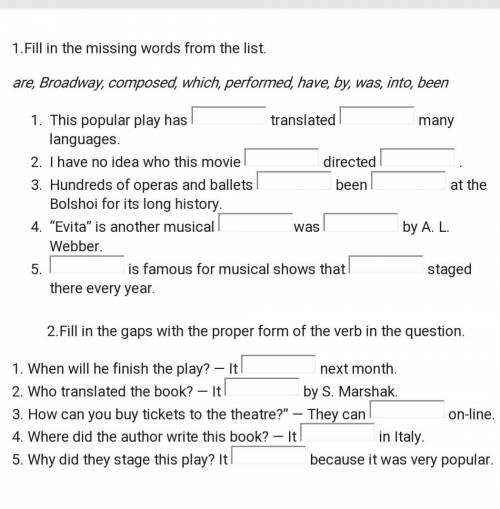очень
are, Broadway, composed, which, performed, have, by, was, into, been
1. This popular play has translated many languages.
2. I have no idea who this movie directed .
3. Hundreds of operas and ballets been at the Bolshoi for its long history.
4. “Evita” is another musical was by A. L. Webber.
5. is famous for musical shows that staged there every year.
2.Fill in the gaps with the proper form of the verb in the question.
1. When will he finish the play? — It next month.
2. Who translated the book? — It by S. Marshak.
3. How can you buy tickets to the theatre?” — They can on-line.
4. Where did the author write this book? — It in Italy.
5. Why did they stage this play? It because it was very popular.

Другие вопросы по теме Английский язык
Популярные вопросы
- Напишите очень надо хан тапсырмасы және хан сынагы...
2 - У паралелограма KLMN ∠MLK=35°.Чому дорівнює кут LMN? Відповіді:а)35°б)145°в)55°г)70°...
1 - 3,5y+y=Сколько будет алгебра...
2 - Көмектесіңдер таппай жатырм...
1 - Вусн выказв: книга и яе роля...
2 - 8. Составь список перелётных птиц. Используй текст произведения и дополнительную...
2 - С ФИЗИКОЙ! Нужно сделать 4 упражнение...
3 - 54редиски связаны в а одинаковох почках, сколько редисин в каждом пучке?...
2 - как будет гореть лампочка в приборе по определению электропроводности в растворе...
1 - ----- ............ .........................
3
Explanation: The verb "translate" is transitive, so it requires an object. In this sentence, the play is being translated, so the verb should be in the passive voice ("has been translated"). The preposition "into" is used to show the target languages.
2. I have no idea who directed this movie.
Explanation: The verb "direct" is intransitive, so it doesn't require an object. The word order in the original sentence is incorrect. It should be "this movie" before the verb "directed".
3. Hundreds of operas and ballets have been performed at the Bolshoi for its long history.
Explanation: The verb "perform" is transitive, so it requires an object. In this sentence, operas and ballets are being performed, so the verb should be in the passive voice ("have been performed").
4. "Evita" is another musical composed by A. L. Webber.
Explanation: The verb "compose" is transitive, so it requires an object. In this sentence, the musical is being composed, so the verb should be in the passive voice ("composed by"). The word order in the original sentence is incorrect. It should be "composed by" before the name "A. L. Webber".
5. Broadway is famous for musical shows that are staged there every year.
Explanation: The verb "stage" is intransitive, so it doesn't require an object. The word order in the original sentence is incorrect. It should be "that are staged" after the noun "shows".
2. Fill in the gaps with the proper form of the verb in the question.
1. When will he finish the play? — It will finish next month.
Explanation: The verb "finish" is intransitive, so it doesn't require an object. The pronoun "it" refers to the play, so the verb should be in the third person singular form ("will finish").
2. Who translated the book? — It was translated by S. Marshak.
Explanation: The verb "translate" is transitive, so it requires an object. In this sentence, the book is being translated, so the verb should be in the passive voice ("was translated by").
3. How can you buy tickets to the theatre? — They can be bought online.
Explanation: The verb "buy" is transitive, so it requires an object. In this sentence, tickets are being bought, so the verb should be in the passive voice ("can be bought"). The preposition "on" in the original sentence should be replaced with "online".
4. Where did the author write this book? — It was written in Italy.
Explanation: The verb "write" is transitive, so it requires an object. In this sentence, the book is being written, so the verb should be in the passive voice ("was written"). The word order in the original sentence is incorrect. It should be "written in" before the location "Italy".
5. Why did they stage this play? It was staged because it was very popular.
Explanation: The verb "stage" is transitive, so it requires an object. In this sentence, the play is being staged, so the verb should be in the passive voice ("was staged"). The word order in the original sentence is incorrect. It should be "was staged" before the reason "because it was very popular".